A Kentucky waterways story
By Ed McClanahan
A few months ago, Danny Mayer, the editor of the highly respectable rag you hold in your hand at this moment, told me he’d heard that back in the late 1950s, my friend Wendell Berry and I took a little three-day canoe trip down the Kentucky River, and asked if I’d be interested in writing a piece recollecting the experience for North of Center’s ongoing series about Kentucky waterways.
Yeah, sure, sez I, and blithely promised him I’d produce 1500 words for the July issue.
So the deadline is coming down, and I’ve got the 1500 words, all right, but somehow I haven’t even got around to mentioning my trip with Wendell yet. (Our canoe itself does make a cameo appearance, although Wendell is nowhere in sight.) What I’ve found myself writing instead is a far more ambitious undertaking, a meditation about my father and me, the surface of which is barely scratched by my measly 1500-word opening salvo. Clearly, this story wants to become a much more expansive piece of writing, and therefore I’m obliged to do my best to make that happen.
My and Wendell’s canoe trip will still be in it, though, and because my dad eventually became a sort of mini-mogul in the river transportation business, it’s still a Kentucky waterways story too—just not exactly the one I intended to tell.
Anyhow, here’s what I’ve got so far:
By the summer of 1943, my dad, the striving young Standard Oil distributor of rural Bracken County, Kentucky, had recently become a 35-year-old draftee in the United States Army, and my mom, already the Chief Clerk of the Bracken County rationing board, was obliged to take on the stewardship of the little Standard Oil biz as well. With two full-time jobs, what she didn’t need was my pudgy, myopic, probably sulky ten-year-old self underfoot all summer long, which is how I too came to get drafted—for six delightfully martial weeks of counting cadence at Kamp Kadet, a summer camp near Versailles, KY, operated by a local military academy.
My dad hated the United States Army, and I hated Kamp fucking Kadet—and for the record, our mutual distaste for our respective boot camp ordeals that summer was probably the closest he and I ever came to seeing eye to eye about anything.
Actually, Kamp Kadet itself was a rather nice place: a cluster of four or five modest one-story frame buildings nestled among the willow trees and sycamores on the shady, sandy banks of the Kentucky River, a picturesque, clean (in those days), mostly navigable little stream that has its headwaters down in the mountains of Eastern Kentucky and meanders northward across the state all the way up to Carrollton, where it empties into the Ohio. Behind Kamp Kadet was a broad bottomland meadow that accommodated a good softball diamond, a running track, and a little archery range. Actually not a bad place at all—if it hadn’t been for Captain fucking Bates.
During the regular school year, Captain Bates was the headmaster of the military academy’s elementary school; in the summertime, he ran the show at Kamp Kadet. I never figured out whether he was a real captain, but he sure knew how to strut around like one, him in his goddamn jodhpurs and riding boots, counting cadence on the noggin of any little boy within reach with the ivory handle of his ever-present riding crop. There wasn’t a horse anywhere on the property, of course; Captain Bates just liked the figure he cut in that get-up. He was a handsome, vain, crewcut martinet who took a pervert’s ugly delight in dominating and brow-beating and generally smacking around a helpless little troop of pre-adolescent boys, who roundly hated him for these attentions. And in company with my fellow unhappy kampers, my distaste for Captain Bates logically extended to Kamp Kadet as well, nice place that it indisputably was.
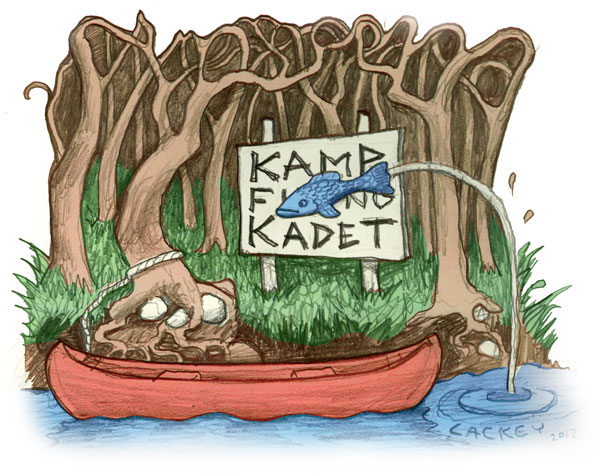
Kamp Kadet, a shady Kentucky River bottom, a canoe, a fish–and still no Wendell in sight. Illustration by John Lackey.
Well, my dad and I both survived that summer of our mutual discontent and many more besides, and the military summer of ’43 faded into distant memory, no doubt for both of us. I know my dad certainly wasn’t thinking about it when … but never mind, I’ll get to that in a minute.
A lot changed over the ensuing 14 years, but none of it stopped the clock, so that by the early summer of 1957, I had somehow morphed into a newlywed grad student in English at the University of Kentucky, where I wasn’t doing well—where, as a matter of incontrovertible fact, I had just flunked the Master’s oral exam, and where, alas, I’d have to trudge through yet another tedious academic year before I’d be eligible to try again.
I was also laboring, at the time, under a secret yearning to go in for la vie Boheme in some capacity or another. Specifically, I wanted to take off with my new bride to some beatnik pad (those accommodations being the hottest thing going, according to Life magazine) in Greenwich Village or San Francisco or maybe even on the Left Bank of the Rue de la Paix in downtown Paris, France, where I would set up shop as a sullen, brooding, existentialist free-lance writer, a trade for which I wouldn’t be needing no piddly-ass MA in English anyhow, thank you very much. This was all a pipedream, of course—I was to a free-lance writer what Captain Bates was to General MacArthur; and for that matter I wasn’t all that sure what “existential” meant, either—, but I had the sullen, brooding part down cold, and that summer I was in no mood to be trifled with.
Now during those same 14 years my father’s circumstances had also changed dramatically, in his case very much for the better. His Standard Oil business had expanded to include the adjoining county, and we had moved to Maysville, a bustling, prosperous Ohio River town 20 miles to the east. In 1948, a Standard Oil Company towboat pushing a tow of petroleum-product barges on the Ohio caught fire and sank, stranding the mighty Standard Oil Company of Kentucky’s river transportation system high and dry. (A towboat, for some obscure nautical reason, does not tow barges, it pushes them; and by the same peculiar logic, the string of barges that the towboat pushes is called … a tow!) My father, who had an exceptionally sharp eye for the main chance, quickly partnered up with another sharp-eyed Standard Oil agent named Pete, and together they scoured the Ohio River dockyards until they turned up an antiquated but sturdy little out-of-work sternwheeler named the Chickasaw. They took in another partner, formed a little company of their own—Triangle Towing—, leased the Chickasaw on the cheap, rounded up a pilot and a crew, and started moving product between Pittsburgh and Paducah for Standard Oil.
The Chickasaw soon proved herself up to the task, and the Triangle partners prospered accordingly. (And I must say I’m damned glad they did, considering that this hatchling of the Chickasaw—namely me— has lived for many years mostly on the proceeds of a trust fund which had its inception in the earnings of that unlovely but lovable old tub, bless her heart.) When they’d raised sufficient cash, the partners bought the hard-working old gal outright, and for the next five years or so she paddled tirelessly back and forth in their service, pushing tows of six or eight petroleum-product barges—immense floating steel vaults, each with a deck the size of a high school basketball court—, plying the Ohio between Pittsburgh and Paducah. Triangle, meanwhile, began accumulating a little string of barges unto itself, which the partners leased to Standard Oil—whose executives they simultaneously showered with country hams, cases of Old Charter, tweed sportcoats, football tickets, and similar wampum, in return for which those wily eminences generously condescended to include Triangle’s barges in the Chickasaw’s tow—meaning that the Standard Oil Company, unbeknownst to its oblivious stockholders, would be paying the Triangle Towing Company untold thousands for moving its—Triangle’s!— own barges!
Which, judging from today’s headlines about Wall Street chicanery, is more or less how most big and wanna-git-big bidness is conducted to this very day … and always has been. But I digress.
So by dint of this and many similar stratagems over the years, my dad and his partners did very well indeed. Eventually, they replaced the Chickasaw with a larger, more up-to-date towboat, the fortuitously-named City of Maysville, and then they added the even larger Elisha Wood and a couple more barges to their burgeoning little navy, and began working for Ashland Oil and Gulf Oil as well as for Standard. Somewhere along the way, my dad bought a summer cottage on a remote local lake, and the purchase included a big red wooden canoe, another addition to the fleet.
Then, in the early summer of 1957, he ponied up big-time for his own personal flagship, a brand-new, ostentatiously bulky, embarrassingly overpowered houseboat, for which he proposed to stage a gala launching party at—of all the spots he could have chosen on all the countless miles of riverbanks and lakeshores in the whole state of Kentucky, my father decided to have his launching party at … Kamp fucking Kadet!
Well, it’s a start. Future installments, regrettably, are liable to be slow in coming. (“Writing,” as I’m notoriously fond of saying, “is like performing brain surgery on yourself. It’s not something you want to hurry with.”) In any event, I’m profoundly grateful to Danny for prompting me to begin the story, and if North of Center and I both manage to hang around long enough, NoC is where I’ll finish it.
Perhaps I should mention here that Wendell disputes my assertion that the launching party took place in 1957; he says it was 1958, sure as hell. I’ll keep trying to nail down the correct answer, but I’m sticking with ’57 until the evidence proves me wrong.
One last thing: I must precede myself just long enough to say that, appearances to the contrary notwithstanding, this is not going to be another ingrate-child-bites-hand-that-fed-him story. In this story, my churlish, resentful attitude toward my dad reaches its nadir on the day of the launching party, begins improving incrementally from that day forward, and does so for the rest of his life, and for all the days thereafter.

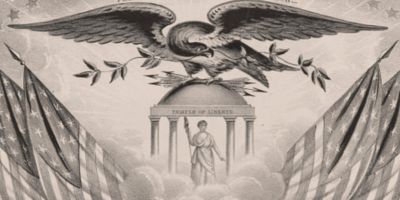
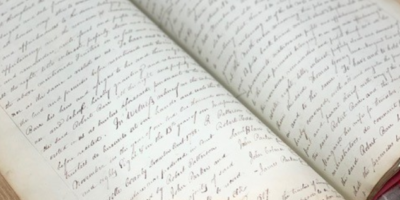
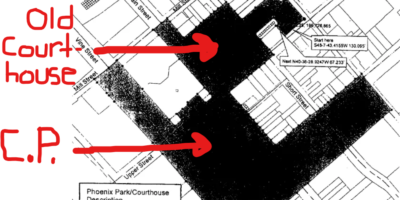
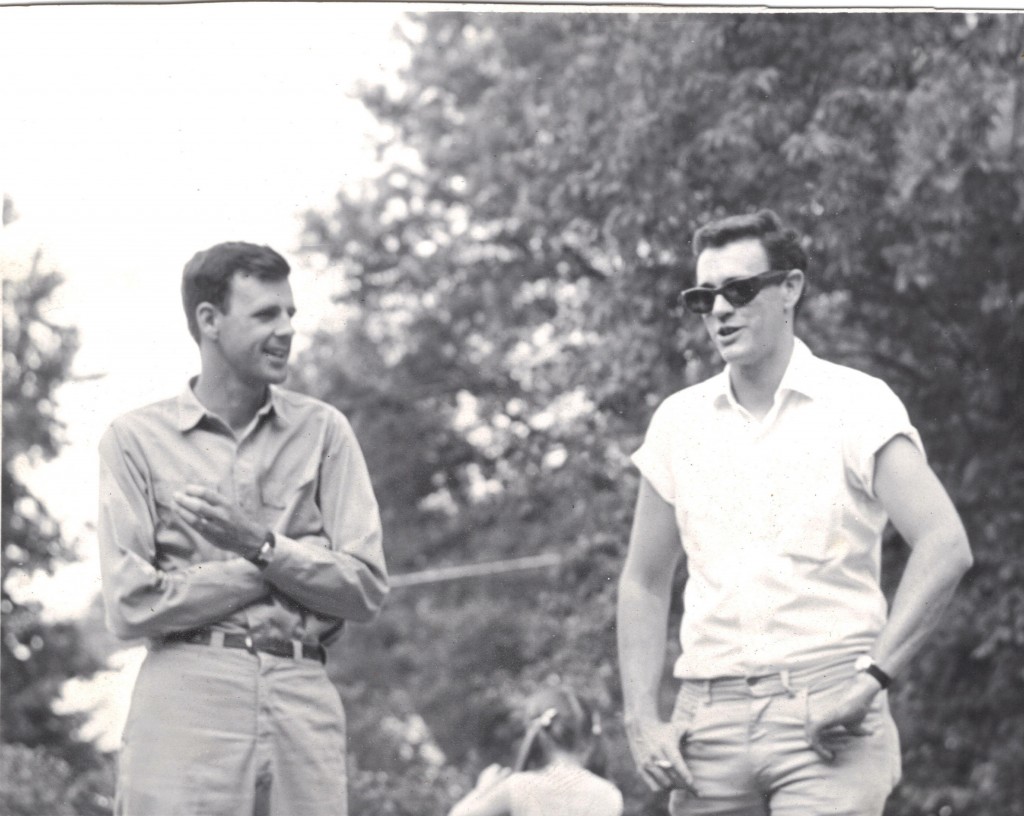
julie mitchell rainey
More please…..!
jack wright
Well it sure is good to see more from one of my fav writers
Mike Martin
Carlos Toadvine, IIRC, would have been 21 in 1957. Did he provide the entertainment for the boat launching?
Connie Royse McDonald
I love a good yarn, and when you spin them, they are always good! Thanks for performing the surgery.
Tona Barkley
More, more! Can never get enough of your humor.
Tom Patterson
An excellent start indeed, Big Ed. I look forward to reading the next installment. In the meantime I might have to borrow that writing/brain surgery analogy.
Harold Tucker
As the late, great Spalding Gray once said “I need corduroy and flannel next to my skin so I can think”.
ed mcclanahan
Me too, but not in July. I don’t intend to think until at least November.
ed mcclanahan
Just wait, Mark. The frost will soon be on the punkin …
Mark Yeager
I hate this time of year but I sure enjoy reading anything by Ed M.
“When the weather’s hot and sticky…”
Ginny Ann Blackson
Ed,
What a great article….thanks so much for sharing your stories!
ginny
ed mcclanahan
Thank you very much, Ginny! Glad you enjoyed it.